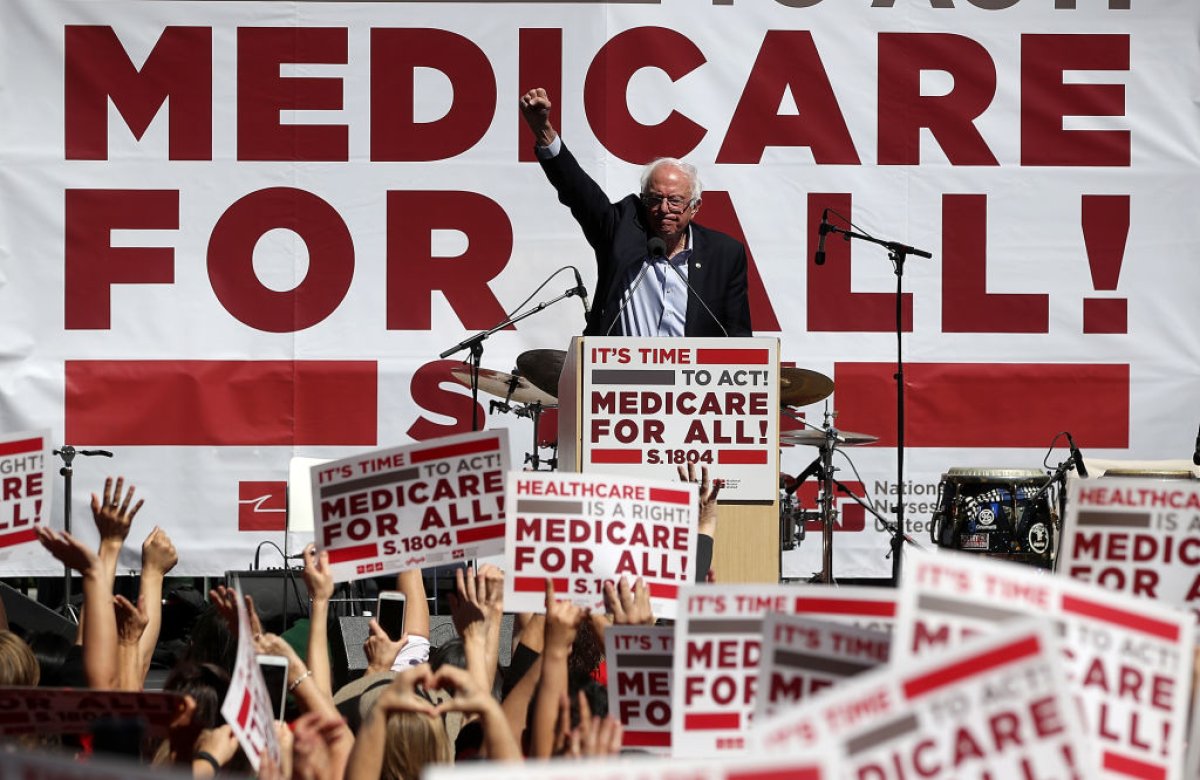The Medicare For All plan proposed by Democratic presidential candidates Bernie Sanders and Elizabeth Warren would save taxpayers hundreds of billions of dollars each year and would prevent tens of thousands of unnecessary deaths, a new study shows.
The analysis, conducted by researchers at Yale University, the University of Florida and the University of Maryland, found that transitioning the U.S. to a single-payer health care system would actually save an estimated $450 billion each year, with the average American family seeing about $2,400 in annual savings. The research, which was published Saturday in the medical journal The Lancet, also found that Medicare for all would prevent about 68,000 unnecessary deaths per year.
"Our study is actually conservative because it doesn't factor in the lives saved among underinsured Americans—which includes anyone who nominally has insurance but has postponed or foregone care because they couldn't afford the copays and deductibles," Alison Galvani, an author of the study and researcher at the Center for Infectious Disease Modeling and Analysis at the Yale School of Public Health, told Newsweek.

Overall, the new research anticipates annual savings of about 13 percent in national health care costs, while providing better health care access to lower-income families. According to the study, about 37 million Americans do not have health insurance, while an additional 41 million people do not have adequate health care coverage. Taken together, about 24 percent of the total population does not have health care coverage that meets their needs.
"The entire system could be funded with less financial outlay than is incurred by employers and households paying for health-care premiums combined with existing government allocations," the authors wrote in the study.
The authors also noted, as Sanders often does when discussing Medicare for all, that health care expenditures in the U.S. are "higher" per capita "than in any other country."
"It is worth noting the absolutely staggering differences in prices for health care paid in the U.S. relative to our rich country peers," Josh Bivens, research director at the Economic Policy Institute, who was not involved with the new study, told Newsweek. "Given this, and given that other countries largely control these costs by centralizing them, it seems to me that the by far most-likely development would be for national health costs to fall under a well-managed M4A [Medicare For All] plan," he said.
Sanders, the Vermont Senator, lauded the study, Common Dreams reported, adding that his plan would guarantee "health care as a human right."
"It will save working-class families thousands of dollars and it will prevent tens of thousands of Americans from dying each year," he said. "While the CEOs in the pharmaceutical and health insurance industry may not like it, we will end their greed and enact Medicare for all when I am president."
The Medicare For All plan, otherwise known as universal health care, has drawn substantial criticism from right-wing critics and moderate Democrats who often question how the senators expect to cover the cost of a single-payer system. Sanders and Warren have pushed specifically for a single-payer, government-based health care system. This plan was analyzed in the study.
However, each of the Democratic candidates vying for their party's presidential nomination said they support expanding public health care in some form. Former Mayor Pete Buttigieg, former Vice President Joe Biden, Senator Amy Klobuchar and billionaire Tom Steyer have argued that Americans should be able to keep their private insurance while there also should be a "public option" to buy into Medicare. Buttigieg has dubbed his plan "Medicare for all who want it."
Buttigieg's plan, Galvani argued, would actually increase costs, not reduce them.
"Without the savings to overhead, pharmaceutical costs, hospital/clinical fees, and fraud detection, 'Medicare for all who want it' could annually cost $175 billion dollars more than status quo," she told Newsweek. "That's over $600 billion more than Medicare for all."
Our words sound even better when Bernie says them! https://t.co/QAztfDNO0C
— Alison Galvani (@Alison_Galvani) February 16, 2020
If any of the Democratic contenders succeed in the general election, they will face an uphill battle to pass major health care reform in a divided Congress. Even some moderate Democrats have qualms about supporting universal health care, while Republicans have long fought against efforts from the left to move toward universal coverage. The Affordable Care Act, commonly known as Obamacare, is still caught up in the courts as the Trump administration attempts to repeal the policy without introducing an alternative option.
Other studies analyzing a proposed universal health care system have come up with different conclusions from those of the new research. While some have shown cost savings, similar to Galvani's study, others have shown that overall expenses would simply even out, while some have predicted that the policy would end up costing substantially more.
Bivens, from the Economic Policy Institute, told Newsweek that the estimated cost savings from the new research was "on the high side" of analyses of Medicare for all. But he noted it was "not a huge outlier."
"The real question is how soon they [the savings] can be realized – it seems hard to imagine this entire gap could be chopped away in one or two years without providing too much of a shock to health care providers," he said. "But it also seems hard to imagine that something like M4A would not be able to deliver really large savings over time-spans of a decade or more."
Uncommon Knowledge
Newsweek is committed to challenging conventional wisdom and finding connections in the search for common ground.
Newsweek is committed to challenging conventional wisdom and finding connections in the search for common ground.
About the writer
Jason Lemon is a Weekend Editor at Newsweek based in Brooklyn, New York. Prior to taking on the editor role, Jason's reporting focused on ... Read more
To read how Newsweek uses AI as a newsroom tool, Click here.








